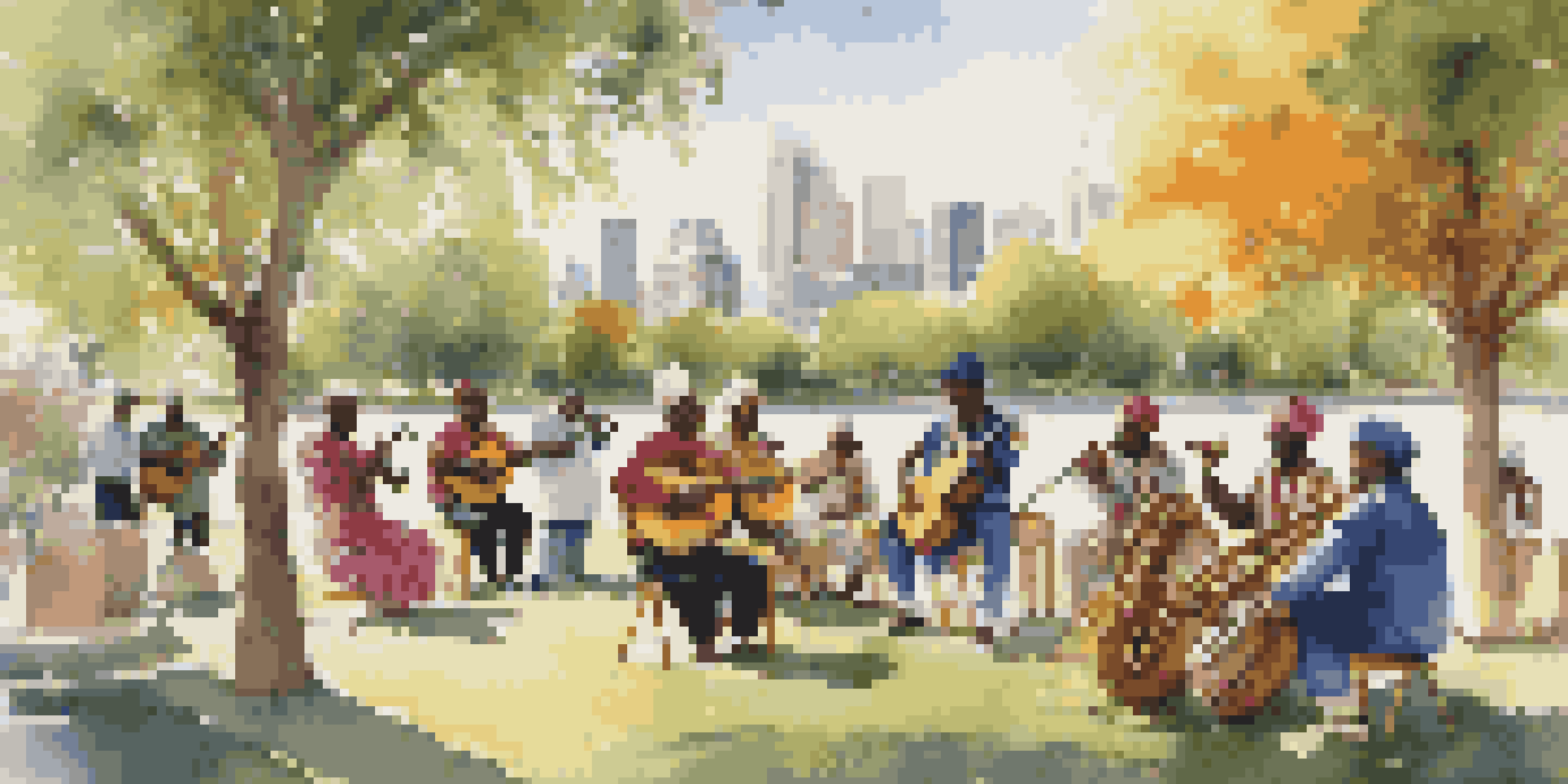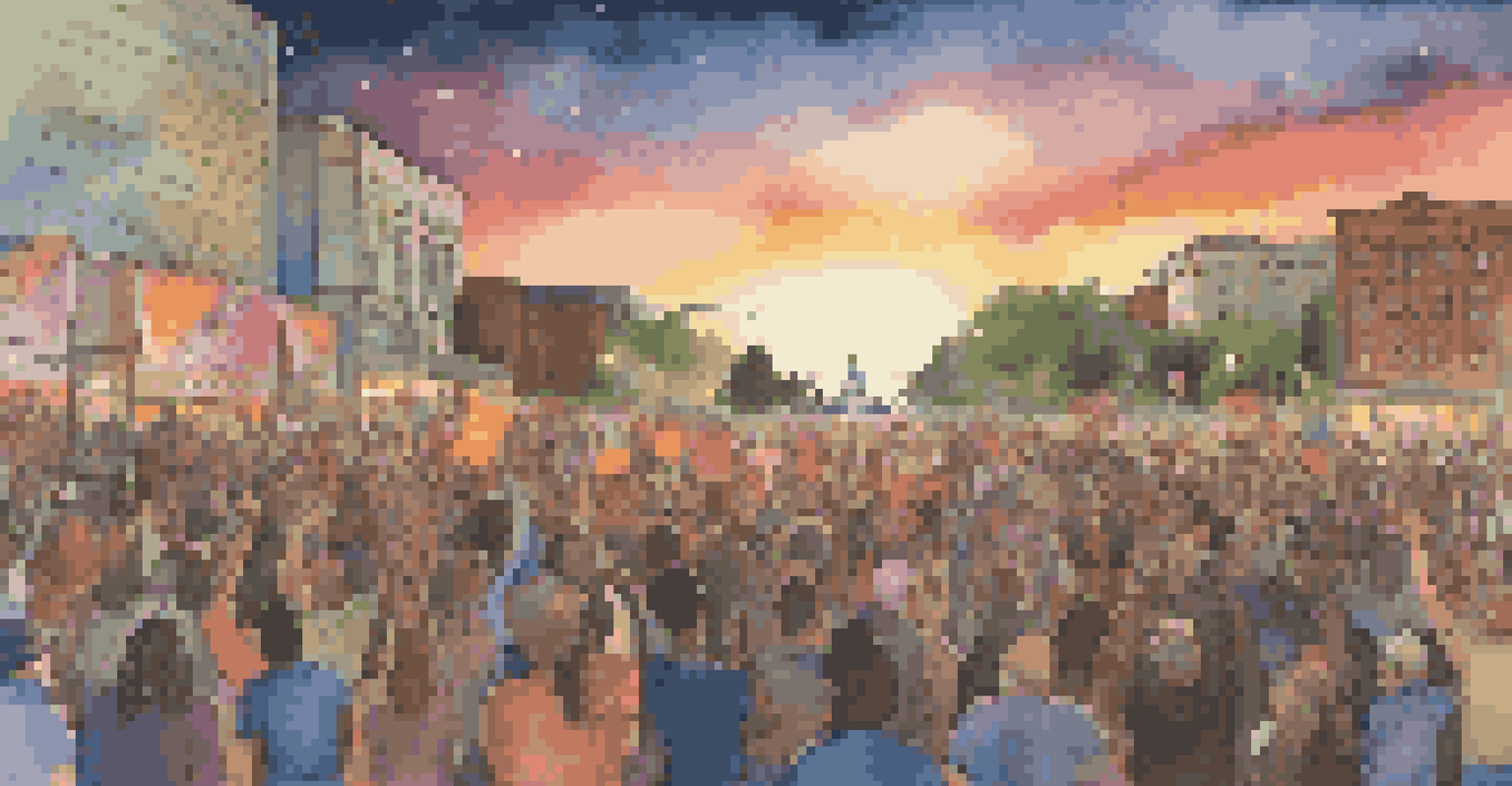The Influence of International Music on Domestic Politics

How International Music Reflects Political Sentiments
Music has always been a mirror of society, reflecting the political landscape of its time. International music often captures the sentiments of listeners, allowing them to resonate with broader political messages. For instance, protest songs from one country can inspire movements in another, as seen with the global influence of Bob Dylan in the 1960s.
Music can change the world because it can change people.
These songs not only entertain but also provide commentary on social issues, engaging listeners in political discourse. When people listen to international music that articulates their struggles, it can motivate them to take action in their own political environment. This interconnectedness highlights how music transcends borders, fostering a sense of solidarity among diverse groups.
Ultimately, the way international music mirrors and influences political sentiments demonstrates its power as a tool for social change. By using melodies and lyrics to articulate experiences, artists can impact the political landscape, encouraging listeners to reflect on their own situations and push for change.
The Role of Music in Political Campaigns and Elections
Political campaigns have long recognized the power of music in shaping public perception and mobilizing voters. International hits often find their way into campaign rallies, as they can evoke emotions and create a sense of unity among supporters. For example, Barack Obama famously used songs from artists like Jay-Z and U2 to energize his campaign in 2008.

These songs, whether they are pop anthems or traditional tunes, can resonate with different demographics, helping candidates connect with a variety of voters. Additionally, the strategic use of music can create memorable moments that enhance the overall message of a campaign. By aligning with popular songs, candidates can harness the emotional power of music to frame their platforms.
In this way, the influence of international music on domestic politics becomes evident through its ability to shape narratives and inspire collective action. When a catchy tune accompanies a political message, it can leave a lasting impression that influences voter behavior.
Music as a Tool for Social Movements
Throughout history, music has played a pivotal role in social movements, often serving as an anthem for change. International music frequently inspires domestic movements, creating a sense of shared purpose among activists. Take, for example, the global impact of songs like 'We Shall Overcome,' which became a rallying cry for civil rights movements across various countries.
The power of music is to bring people together.
These songs encapsulate the struggles and aspirations of those fighting for justice, fostering a sense of community and collective identity. When activists draw upon international music, they can tap into the emotions and experiences of a broader audience, amplifying their message. This interconnectedness can lead to stronger alliances and more significant political impact.
Ultimately, music transforms from mere entertainment to a powerful weapon for social change. By harnessing the emotional weight of international music, activists can inspire action and rally support for their causes, illustrating how deeply intertwined music and politics can be.
Cultural Exchange: Music Bridging Political Divides
International music fosters cultural exchange, often bridging divides between different political ideologies. Through shared musical experiences, individuals can find common ground despite differing political beliefs. For instance, collaborations between artists from opposing countries can promote understanding and dialogue.
These musical partnerships can challenge stereotypes and break down barriers, allowing for a richer appreciation of diverse perspectives. When people engage with music from different cultures, they are often encouraged to explore the political contexts that shape those sounds. This exploration can foster empathy and broaden political discourse.
In essence, music serves as a universal language that transcends political divides, creating opportunities for connection and understanding. As international music continues to circulate, it has the potential to reshape how we view our differences and similarities, ultimately influencing domestic political landscapes.
The Impact of Globalization on Local Music Scenes
Globalization has led to the widespread availability of international music, significantly impacting local music scenes. As listeners are exposed to diverse genres and styles, local musicians often blend these influences into their work, creating new sounds that reflect their unique cultural contexts. This fusion can lead to the rise of genres that resonate with both local and international audiences.
However, this influx of global music can also pose challenges for local artists trying to carve out their niche. The dominance of international hits can overshadow regional music, making it difficult for local talent to gain recognition. Nevertheless, many artists leverage these global influences to create something distinctive, often addressing local political issues through their music.
In this way, globalization not only shapes the sound of local music but also its political narrative. By incorporating international styles and messages, musicians can engage with both local and global audiences, ultimately influencing domestic politics through their art.
The Role of Technology in Music and Politics
The rise of technology has transformed how international music influences domestic politics. With the advent of streaming platforms and social media, music can now spread rapidly across borders, allowing political messages to reach a wider audience. Artists can share their work and engage with fans directly, bypassing traditional gatekeepers and amplifying their political statements.
For instance, songs that address pressing social issues can go viral, sparking discussions and movements around the world. This democratization of music distribution means that anyone with an internet connection can access and share powerful political messages through song. As a result, music becomes an essential tool for grassroots organizing and activism.
Ultimately, technology has not only changed how we consume music but also how music interacts with politics. By making international music more accessible, technology empowers individuals to connect through shared experiences and influences domestic political narratives.
The Future of Music's Influence on Politics
As we look to the future, the interplay between international music and domestic politics remains poised for evolution. The growing interconnectedness of the world suggests that music will continue to serve as a vital platform for political expression. Artists will likely harness emerging technologies and social media to amplify their voices, reaching audiences in innovative ways.
Moreover, as global challenges such as climate change and social justice take center stage, music will undoubtedly play a crucial role in shaping the narratives around these issues. Artists from diverse backgrounds will continue to collaborate and create powerful anthems that resonate with audiences and inspire action. This collaborative spirit can foster a sense of global community that transcends borders.

In conclusion, the relationship between international music and domestic politics is an ever-evolving landscape. As artists continue to find new ways to engage with political themes, they will undoubtedly influence the political discourse and inspire future generations to advocate for change through their art.